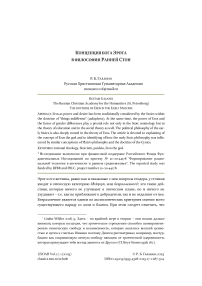Концепция бога Эрота в философии ранней стои
Автор: Галанин Р.Б.
Журнал: Schole. Философское антиковедение и классическая традиция @classics-nsu-schole
Рубрика: Статьи
Статья в выпуске: 1 т.17, 2023 года.
Бесплатный доступ
Несмотря на то что область эроса в этике стоиков входит в категорию безразличного, тем не менее Эрот и связанная с ним проблематика гендерной дихотомии является важным фактором в структуре стоической космологии. Если приглядеться внимательней, то можно заметить, что Эрос играет также важную роль в педагогической теории ранней Стои, равно как и в ее учении о государстве. Ранние стоики, отказывая Эроту с статусе божественности, тем не менее рассматривают его в качестве всеохватной социальной силы, устрояющей повседневную политическую жизнь людей, с одной стороны, и всепроникающей космической силы при возникновении и уничтожении вселенского тела Космоса, который и есть подлинный бог, с другой. Статья посвящена прояснению концепта бога Эрота в учении ранней Стои и обнаружению взаимовлияний с другими философскими учениями того времени - в первую очередь с платонизмом и кинизмом.
Рациональная теология, бог эрот, стоицизм, пайдейа
Короткий адрес: https://sciup.org/147241563
IDR: 147241563 | DOI: 10.25205/1995-4328-2023-17-1-287-304
Список литературы Концепция бога Эрота в философии ранней стои
- Столяров, A.(i995) Стоя и Стоицизм. Москва.
- Annas, J. (1993) The Morality of Happiness. Oxford University Press.
- Baldry, H. C.(1959) "Zeno's Ideal State," The Journal of Hellenic Studies 79, 3-15.
- Boys-Stones, G. (1998) "Eros in Government: Zeno and the Virtuous City," The Classical
- Quarterly 48. 1, 168-74. Dowson, D. (1992) Cities of the Gods: Communist Utopias in Greek Thought. Oxford University Press.
- Gaca, K. (2003) The Making of Fornication: Eros, Ethics, and Political Reform in Greek Philosophy and Early Christianity. University of California Press.
- Grahn-Wilder, M. (2020) Gender and Sexuality in Stoic Philosophy. Palgrave.
- Haentjens, A. (2000) "Reflections on Female Infanticide in the Greco-Roman World," L'Antiquité classique 69.1, 261-264.
- Inwood, B. (1985) Ethics and Human Action in Early Stoicism. Oxford University Press.
- Inwood, B. (1997) "Why Do Fools Fall in Love?", in R. Sorabji, ed. Aristotle and After. London: Institute of Classical Studies, 55-69.
- Kapparis, K. (2018) Prostitution in the Ancient Greek World. Berlin: De Gruyter.
- Mansfeld, J. (1979) "Providence and the Destruction of the Universe in Early Stoic Thought," in M.J. Vermaseren, ed. Studies in Hellenistic Religions. Leiden: Brill, 129188
- Mansfeld, J. (1983) "Resurrection Added: The Interpretatio Christiana of a Stoic Doctrine," Vigiliae Christianae 37. 3, 218-33.
- Nussbaum, M. (2002) "Eros and Ethical Norms: Philosophers Respond to a Cultural Dilemma," in M. C. Nussbaum and J. Sihvola, eds. The Sleep of Reason: The Erotic Experience and Sexual Ethics in Greece and Rome. Chicago, 55-94.
- Patterson, C. (1985) "'Not Worth the Rearing': The Causes of Infant Exposure in Ancient Greece," Transactions of the American Philological Association (1974-), 115, 103-123.
- Pohlenz, M. (1980) Die Stoa: Geschichte einer geistigen Bewegung. Gottingen: Vanden-hoeck & Ruprecht.
- Price, A. (2002) "Plato, Zeno, and the Object of Love," in M. C. Nussbaum and J. Sihvola, eds. The Sleep of Reason: The Erotic Experience and Sexual Ethics in Greece and Rome. Chicago, 170-199.
- Sassi, M. (2018) The Beginnings of Philosophy in Greece. Princeton University Press.
- Schofield, M. (1991) The Stoic Idea of the City. The University of Chicago Press.
- Reydams-Schils, G., tr. (2020) Calcidius on Plato's Timaeus. Cambridge University Press.
- Wildberger, J. (2018) The Stoics and the State. Theory - Practice - Context. Baden-Baden.


